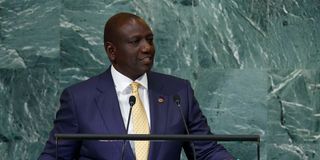Experts welcome President Ruto’s take on climate crisis at UNGA

Kenyan President William Ruto speaks during the 77th session of the United Nations General Assembly (UNGA) at UN headquarters on September 21, 2022 in New York City.
Climate experts have lauded President William Ruto’s inaugural speech at the 77th session of the United Nations General Assembly (UNGA) in the US.
Dr Ruto reminded the world that during the Stockholm+50 climate meeting earlier this year, which Kenya co-hosted with Sweden, consensus was reached among states that environmental impacts should be addressed urgently.
“Given this agreement, it is deeply concerning that little progress has been made in respect of the needful actions,” President Ruto said.
“It is time to collectively contemplate urgent measures needed to implement high-priority actions required to contain ongoing disruptions, as we deliberate on long-term implementation approaches to be undertaken.
“I fully agree with (UN Secretary-General Antonio Guterres’)] memorable statement that “we have a rendezvous with a climate disaster”.
Speaking to the Nation on Thursday, Mr Philip Osano, director of the Africa Centre at the Stockholm Environment Institute, said President Ruto’s speech highlighted two major global environmental issues for which Kenya is recognised globally as a leader and champion.
“On climate change, the President underscored the worsening situation facing African countries and especially the drought and the food insecurity situation afflicting the Horn of Africa, which is largely due to climate change,” Mr Osano said.
“This underscores the need for increased investment and financing for adaptation and resilience which are high priority for African countries ahead of the 2022 United Nations Climate Change Conference (COP27) [to be] held in Sharm El-Sheikh, Egypt, in November this year.”
He lauded President Ruto’s commitment to oceans and the blue economy.
“It is great to note the commitment by Kenya to put in place a National Blue Economy Strategy, following on from the Africa Blue Economy Strategy developed by the African Union based on the recommendation from the 2018 Sustainable Blue Economy Conference (SBEC) that was hosted by Kenya,” Mr Osano said.
“SEI has collaborated with the government in documenting the scientific outcomes of the 2018 Sustainable Blue Economy Conference and will continue with this collaboration to ensure that scientific evidence and technological capacity underpins the strategy …”
Dr Ruto’s address to UNGA77 came two weeks after he promised to make tackling climate change a top priority, besides a 1000 percent transition to clean energy by 2030 in his first inauguration speech.
Kenyans are suffering from the consequences of the climate emergency, he said.
“It is not too late to respond. To tackle this threat, we must act urgently to keep global heating levels below 1.5C, help those in need and end addiction to fossil fuels,” he said.
“We have immense potential for renewable energy. Reducing costs of renewable energy technologies make this the most viable energy source.”
Dr Ruto has inherited a myriad of ‘climate promises’ made by his predecessor, Uhuru Kenyatta, including setting up a presidential youth climate commission fully funded by the Office of the President, a promise Mr Kenyatta made to Kenyan youth climate envoys in Stockholm earlier this year.
Democratic voice
Mr Kenyatta was responding to requests from 28-year-old Kenyan climate activist Elizabeth Wathuti, who spoke on behalf of the envoys.
“We have three asks for you,” Ms Wathuti said at the time. “Our first ask is that you, Mr President, consider establishing and announcing a Youth Presidential Climate Commission for Kenya Youth, understanding that it can be challenging for the government to channel the democratic voice of the many people trying to make change in this space.”
Ms Wathuti also proposed that each ministry establish a youth desk and urged Mr Kenyatta to let young people know how they could best support him on this.
“In the lead-up to COP27 and beyond, we would like to use this platform to ensure that the priorities of Kenya – and other African countries – are centred in any high-level discussions that we are part of,” she said.





